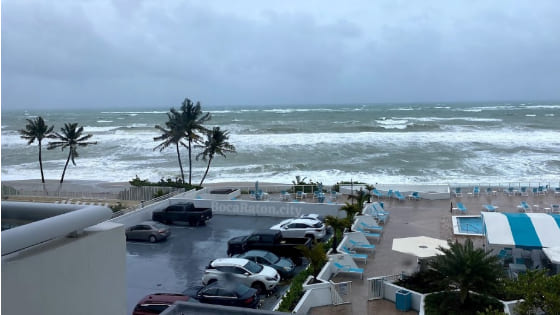
Learn how to stay safe when hurricanes hit Florida. Get tips on hurricane preparedness.
If you’re planning a trip to Florida, it’s important to be aware of the state’s hurricane season. Hurricane season in Florida typically runs from June 1st to November 30th, but what month do most hurricanes hit Florida? In this article, we’ll take a closer look at hurricane activity in Florida and provide some tips for staying safe during hurricane season.
Understanding Hurricane Season in Florida
Before we dive into the details of when hurricanes are most likely to hit Florida, let’s take a look at why the state is so vulnerable to these storms. Florida is located in a region that’s particularly prone to hurricanes due to its warm waters and geographic position. Warm water provides the energy that hurricanes need to form and strengthen, and the state’s location puts it in the path of many storms that originate in the Atlantic Ocean.
Hurricane season in Florida lasts from June 1st to November 30th. During this time, the state experiences the most hurricane activity, with the highest concentration of storms typically occurring in August and September.
When Do Most Hurricanes Hit Florida?
So, what month do most hurricanes hit Florida? While hurricanes can occur at any time during hurricane season, August and September are typically the busiest months for hurricane activity in the state. This is due to a combination of factors, including warmer waters in the Atlantic and the Gulf of Mexico, as well as the presence of atmospheric conditions that are favorable for hurricane formation.
To give you an idea of the level of activity that occurs during these months, let’s take a look at some statistics from the National Hurricane Center. According to their data, the month of September has seen the most hurricane activity in Florida over the past 100 years. During this month, an average of 1.7 hurricanes make landfall in the state.
Staying Safe During Hurricane Season
Stay safe during hurricane season in Florida. Learn how to prepare for storms. Now that we’ve covered when hurricanes are most likely to hit Florida, let’s talk about some tips for staying safe during hurricane season. Here are a few things to keep in mind:
Pay Attention to Weather Warnings
One of the most important things you can do to stay safe during hurricane season is to pay attention to weather warnings. If a hurricane is approaching, make sure you’re up-to-date on the latest forecasts and evacuation orders. Be prepared to evacuate if necessary, and make sure you have a plan in place for how you’ll stay safe during the storm.
Prepare Your Home
Another key aspect of staying safe during hurricane season is preparing your home. This may include boarding up windows, securing outdoor objects, and ensuring that your home’s roof is in good condition. Be sure to stock up on essentials like food, water, and medication, and have a first-aid kit on hand in case of emergencies.
Evacuate If Necessary
If you’re told to evacuate, do so as soon as possible. Don’t wait until the last minute to leave, as roads may become congested or impassable during the storm. Make sure you have a plan for where you’ll go and how you’ll get there, and follow the instructions of local authorities.
Stay Informed
Finally, make sure you stay informed during hurricane season. Keep up-to-date on the latest weather forecasts, and follow news outlets and social media for updates on the storm’s progress. This can help you make informed decisions about your safety and help you prepare for the storm.
FAQs
What Are the Names of the Hurricanes in 2022?
The names of the hurricanes in 2022 have not yet been announced. The National Hurricane Center releases a list of hurricane names each year, which is used on a rotating basis every six years. The list for 2021 included names like Ana, Elsa, and Nicholas.
How Do Hurricanes Form?
Hurricanes form over warm ocean waters when the air above the water becomes warm and moist, which causes it to rise. As the warm air rises, it creates an area of low pressure at the surface of the ocean. The surrounding air rushes in to fill the low-pressure area, and as it rises and cools, it forms clouds.
As the storm continues to grow, it can develop into a hurricane with sustained winds of 74 miles per hour or more. The storm can also create a storm surge, which is a large dome of water that is pushed toward the coast by the hurricane’s winds.
How Does Florida Prepare for Hurricane Season?
Hurricanes Hit Florida: How to Protect Your Home. Florida takes hurricane season very seriously and has implemented a number of measures to help residents prepare for storms. These include:
- Evacuation orders: Local officials may issue evacuation orders for areas that are at high risk of flooding or other storm-related damage. These orders are typically issued in advance of the storm to give residents time to prepare and evacuate safely.
- Emergency supplies: Florida has a comprehensive emergency management system in place to provide residents with the supplies they need to weather the storm. This includes food, water, and other essentials like flashlights and batteries.
- Building codes: Florida has some of the most stringent building codes in the country when it comes to hurricane safety. These codes are designed to ensure that homes and buildings are constructed in a way that can withstand hurricane-force winds and other storm-related damage.
- Public education: Florida also provides extensive public education campaigns to help residents understand the risks of hurricanes and how to prepare for them. This includes information about evacuation routes, shelter locations, and other key safety tips.
Conclusion
Hurricane season in Florida is a serious matter, and it’s important to be aware of when hurricanes are most likely to hit the state. While hurricanes can occur at any time during the season, the highest concentration of storms typically occurs in August and September. By paying attention to weather warnings, preparing your home, and staying informed, you can help keep yourself and your family safe during hurricane season.
Remember to always follow the instructions of local officials and evacuate if necessary. By taking the necessary precautions, you can help ensure that you’re prepared for whatever the storm may bring.






